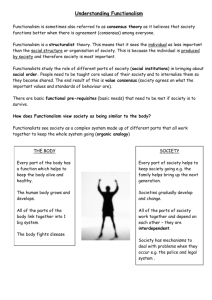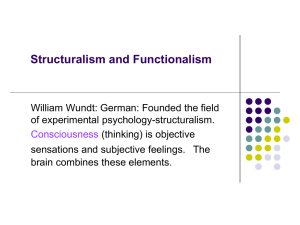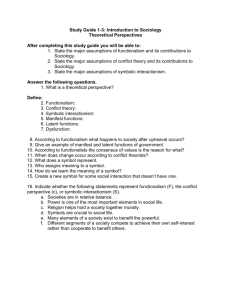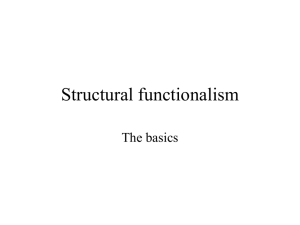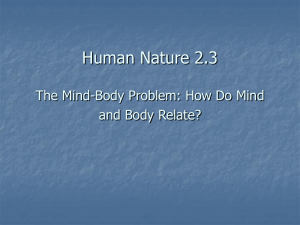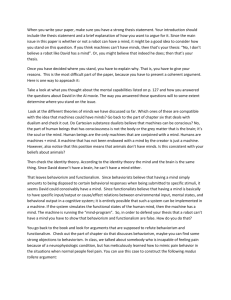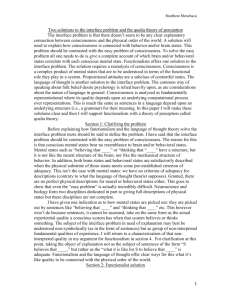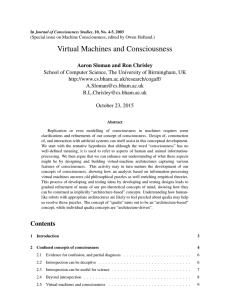CHURCHLAND 3: FUNCTIONALISM (317-321)
advertisement
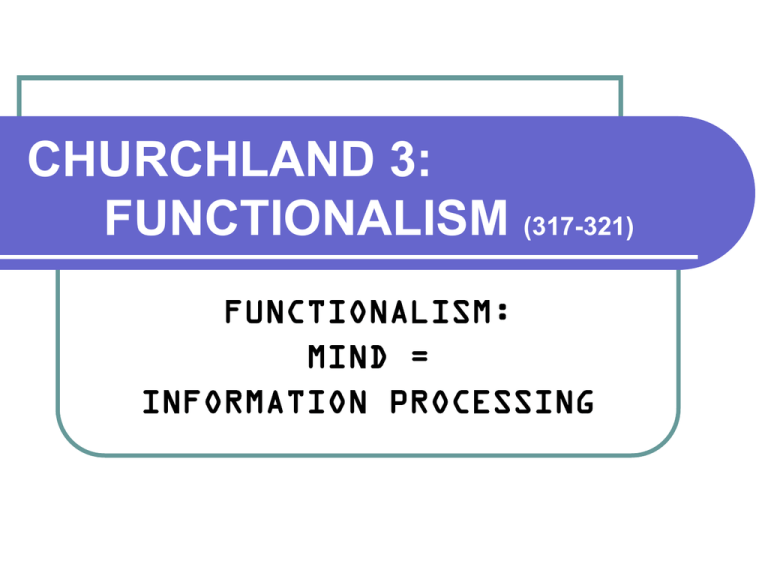
CHURCHLAND 3: FUNCTIONALISM (317-321) FUNCTIONALISM: MIND = INFORMATION PROCESSING FUNCTIONALISM 1] Metaphysical basis of Cognitive Science 2] Functional objects/concepts: chair, heart, wing, Beethoven’s 5th 3] Main metaphor (from computing): mind/brain = software/hardware translation: mind relates to brain as software relates to hardware 1. Heir to Behaviorism (p. 317,see pp. 309-11 for behaviorism) Behaviorism: 1) Stimulus 2) Response Functionalism: 1) environmental effects [stimulus] + 2)other mental states 3) bodily behavior 2. Functional Isomorphism (pp317-18) [Functionalism accommodates Multiple Instantiation] Animal, alien (or computer) made of different substance than we are could have same mental state/s as us, if s/he (it) has state/s with same function. [Think of chairs/stoves/etc. made of very different materials with different designs.] 3. Essence of mental (p. 318 top left) What makes a mind a mind is its function—not its substance. [Core idea: each type of mental state/process/ability/etc. is some sort of information state/process/ability/etc.] 4. Token Identity Materialism (p. 318) [type/token = kind/instance] Type identities: H2O = water mind = brain; consciousness = brain process Token identities: that chair = steel structure this mind = this brain that mind = that computer this pain = this brain process that pain = that hydraulic process 5. Methodological Autonomy (p. 318) Just as Software Engineering (design and construction of software) is distinct from Computer Engineering (design and construction of computer) So too Psychology (study of brain function) is distinct (hence autonomous) from Neuroscience (study of brain biology, chemistry, physics, etc.) Arguments against Functionalism 1. Inverted Qualia Argument (318-19) Qualia = qualities of consciousness Red may look to me like green looks to you, etc., though we both call red “red” (are functionally identical). Different qualia may have same function, so functionalism is incomplete: it does not tell us what each other’s experience is like. Arguments against Functionalism 2. Absent Qualia Argument (319-20) If we built a robot that was functionally like a human, how do we know it has any qualia at all? Suppose, for instance, the robot was controlled by a building full of experts via a radio link—are we really to think that somehow the robot (+ experts) actually has (have) consciousness? “ZOMBIES” Arguments against Functionalism 3. Species Specific Identities (320-21). Temperature is a single property that is instantiated differently in a solid, a liquid, a gas, or a vacuum. BUT there are still type identities: e.g, temp in a gas = mean kinetic molecular energy By Analogy: perhaps Consciousness in a human = brain process
